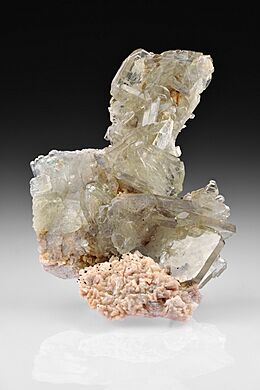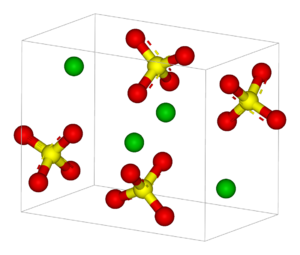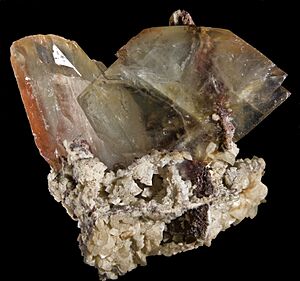Baryte facts for kids
Quick facts for kids Baryte (barite) |
|
|---|---|

Baryte crystals from Cerro Huarihuyn, Miraflores, Huamalíes, Huánuco, Peru
|
|
| General | |
| Category | Sulfate mineral, barite group |
| Formula (repeating unit) |
BaSO4 |
| Strunz classification | 7.AD.35 |
| Dana classification | 28.03.01.01 |
| Crystal symmetry | Pnma |
| Unit cell | a = 8.884(2) Å, b = 5.457(3) Å, c = 7.157(2) Å; Z = 4 |
| Identification | |
| Color | Colorless, white, light shades of blue, yellow, grey, brown |
| Crystal habit | Tabular parallel to base, fibrous, nodular to massive |
| Crystal system | Orthorhombic |
| Cleavage | Perfect cleavage parallel to base and prism faces: {001} Perfect, {210} Perfect, {010} Imperfect |
| Fracture | Irregular/uneven |
| Tenacity | Brittle |
| Mohs scale hardness | 3–3.5 |
| Luster | Vitreous, pearly |
| Streak | White |
| Diaphaneity | transparent to opaque |
| Specific gravity | 4.3–5 |
| Density | 4.48 g/cm3 |
| Optical properties | biaxial positive |
| Refractive index | nα = 1.634–1.637 nβ = 1.636–1.638 nγ = 1.646–1.648 |
| Birefringence | 0.012 |
| Fusibility | 4, yellowish green barium flame |
| Diagnostic features | white color, high specific gravity, characteristic cleavage and crystals |
| Solubility | low |
Baryte, also called barite, is a common mineral. It is made of barium sulfate (BaSO4). This means it contains the elements barium (Ba), sulfur (S), and oxygen (O).
Baryte is usually white or clear. It is the main natural source of the element barium. Baryte belongs to a group of minerals that includes celestine, anglesite, and anhydrite.
Contents
What's in a Name?
The name baryte comes from a Greek word, barús, which means 'heavy'. This is because baryte is quite heavy for a mineral. In America, it is often spelled barite.
Long ago, in the 1600s, a special type of baryte found near Bologna, Italy, was called Bologna Stone. People noticed it could glow in the dark after being heated. This made it very interesting to alchemists, who were early scientists trying to understand how things worked.
Scientists discovered that baryte contained a new element in the late 1700s. Sir Humphry Davy was the first to successfully separate this element, which he named barium, in 1808.
Over time, baryte has had other names too. Some of these include heavy spar and blanc fixe.
Where is Baryte Found?
Baryte can be found in many different places around the world. It often forms in limestone rocks, especially where there are lead and zinc deposits. You can also find it near hot springs. Sometimes, it is found with other minerals like anglesite and celestine.
This mineral has even been found in meteorites! Some of the countries where baryte is mined include China, India, Morocco, Mexico, and the United States.
In 2019, about 9.5 million metric tons of baryte were produced globally. China and India are the biggest producers. The United States, China, and the Middle East are the biggest users of baryte.
What is Baryte Used For?
In Oil and Gas Drilling
The most common use for baryte, about 70% of it, is in oil and gas exploration. It is added to a special liquid called "drilling mud." This mud is pumped into the well as it is being drilled.
Baryte makes the drilling mud very heavy. This weight helps to control the pressure deep underground and prevents dangerous blowouts. Baryte is also useful because it is not magnetic, so it doesn't mess up any magnetic tools used in the well.
For drilling, baryte is ground into a very fine powder. It needs to be dense and soft enough not to damage the drilling equipment.
Other Uses for Baryte
Baryte is used in many other cool ways too!
- It can be added to paints and plastics as a filler.
- It helps reduce noise in car engines.
- It makes car finishes smooth and helps prevent rust.
- It is used in special concrete that can block radiation.
- It is used to make certain types of glass and ceramics.
- In medicine, a special liquid containing barium is used for barium meals. Patients drink this before an X-ray or CT scan to help doctors see their digestive system more clearly.
Historically, baryte was used to refine sugar and as a white color for textiles, paper, and paint. Even though baryte contains barium, which can be harmful on its own, the barium in baryte is very safe. This is because barium sulfate is extremely hard to dissolve in water, so it doesn't get into your body easily.
Sometimes, beautiful baryte crystals are even cut and polished to be used as gemstones!
See also
- Hokutolite
- Rose rock
 | Bayard Rustin |
 | Jeannette Carter |
 | Jeremiah A. Brown |





